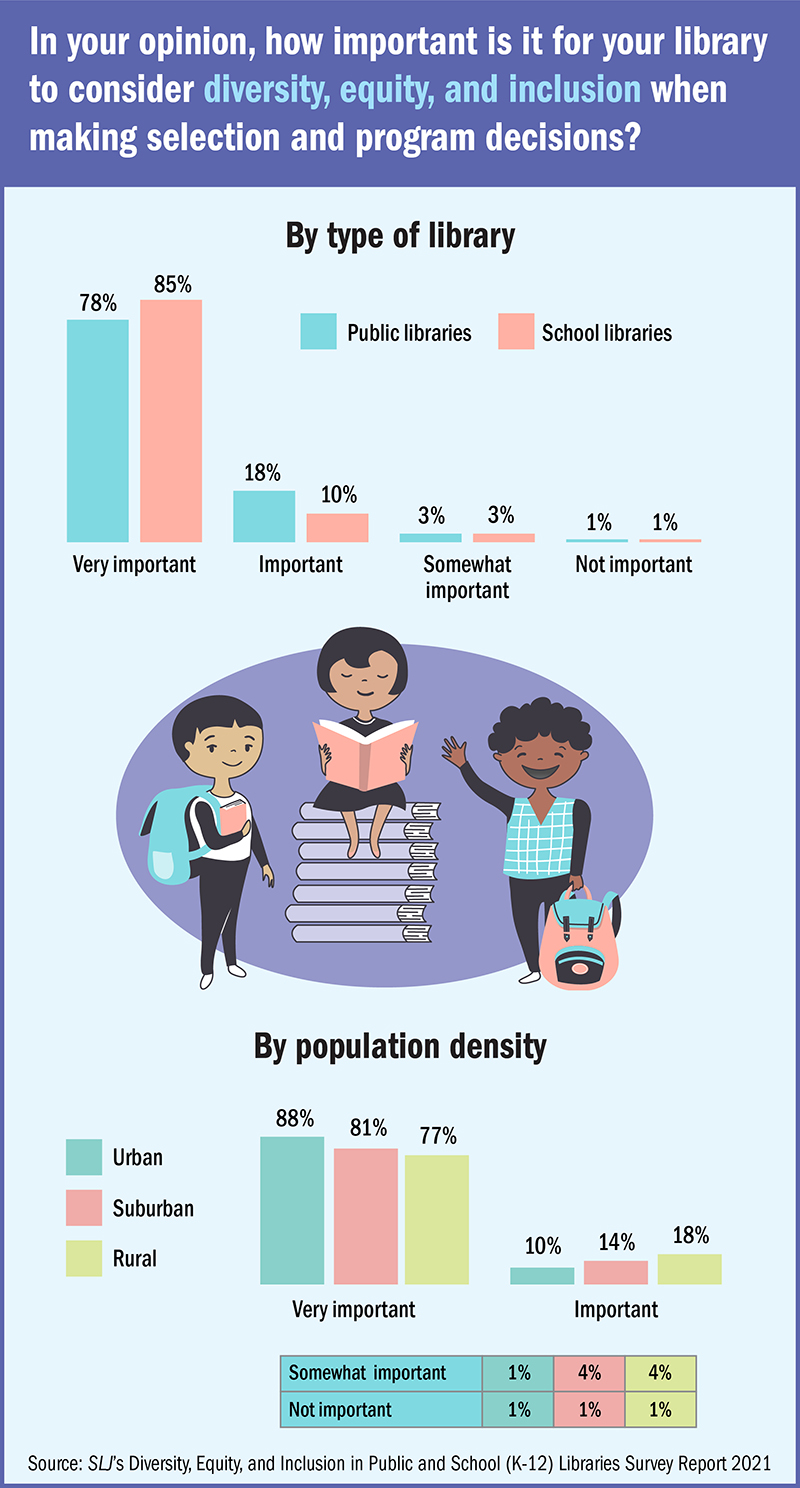Action, Not Words. Equity Efforts Will Not Exceed Theater Without Meaningful Support.
Nearly all librarians, school and public, consider EDI/DEI in collection development, according to SLJ's recent survey. Leadership however, drew criticism for paying lip service to these efforts or, in some cases, bending to patron pressure, without real support for diversity, equity, or inclusion.
 |
Click image to enlarge |
Statements by institutions decrying racism—there is an actual list of these maintained by Library Journal’s InfoDocket since last year—could effectively trail to the floor.
Whether or not your organization has issued such a declaration, there is likely a related effort, increasingly formalized, toward diversity, equity, and inclusion (DEI/EDI). Diversity committees, task forces, and consultants abound, all with a presumed goal of ensuring equitable workplaces and by extension enhancing the greater society.
Frontline workers in libraries are doing their part. Nearly all public (95 percent) and school libraries (96 percent) report that DEI factors into their collection development choices, according to a Diversity, Equity, and Inclusion in Libraries survey SLJ fielded in June.
Support for these efforts is a bit more variable. But that’s where the rubber meets the road in terms of real change.
Based on open-ended comments in our survey, library staff want more backing from administration and, on the public side, library boards. Some told us they suspect leadership of paying lip service to these efforts, without real support for diversity, equity, or inclusion. Commenters lauded their principals for funding purchases toward diverse representation in collections, while others accused administrators of bending to patron pressure.
“Although we have a DEI committee, it is brand new with no clear goals or communication to the rest of the library. Since DEI efforts have been shot down in the past, many staff are wary of how much buy-in from admin there actually is, and if the committee is just a gesture.”
“[The] administration [should] actually take a stand and say, ‘Yes, we believe in this,’ instead of mitigating the message in an effort to not inflame racists who may take offense.”
Perhaps the greatest disappointment we heard from library staff—and most alarming to me—is indifference from administrators and colleagues. When asked “How supported do you feel in your efforts to address DEI in the library?” Rhonda Bell, of Western Hills High School, KY, wrote: “No one says much to me one way or the other, so I don’t know if they are okay with what I do, OR they don’t know what I’m doing, OR they don’t care what I’m doing.”
Development and adoption of formal DEI policy is an important step. And standing behind that policy would imply enforcement and related training.
Staff are particularly in need when it comes to interfacing with the public. One-third of both school and public libraries have received negative feedback about DEI content in books, displays, or programs, our survey found. In schools, that opposition is leveled by parents (84 percent); in public libraries, by patrons (88 percent).
“My district (in a wealthy, suburban area) has received a lot of pushback from a very vocal minority to DEI efforts this year,” wrote a survey respondent. “We have since had multiple book challenges and parents have contacted the board and posted on social media voicing their opposition to books containing LGBTQIA+ characters and dealing with issues of race and racism. Luckily, no formal policy changes have been made in response to these complaints, but many teachers are hesitant to include this content in their lessons now.”
Moving the needle on equity, like anything else, requires support across the power spectrum. And given the growing pushback in the culture, it behooves us all to get behind librarians. Mere statements are just that: lip service.
For the full survey report, visit slj.com/research.


RELATED
The job outlook in 2030: Librarians will be in demand
The job outlook in 2030: Librarians will be in demand
ALREADY A SUBSCRIBER? LOG IN
We are currently offering this content for free. Sign up now to activate your personal profile, where you can save articles for future viewing






Add Comment :-
Be the first reader to comment.
Comment Policy:
Comment should not be empty !!!